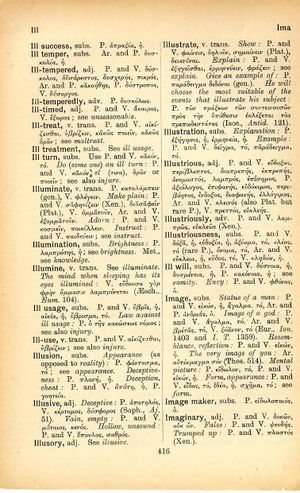illustration: Difference between revisions
From LSJ
Περὶ τοῦ ἐπέκεινα τοῦ νοῦ κατὰ μὲν νόησιν πολλὰ λέγεται, θεωρεῖται δὲ ἀνοησίᾳ κρείττονι νοήσεως → On the subject of that which is beyond intellect, many statements are made on the basis of intellection, but it may be immediately cognised only by means of a non-intellection superior to intellection
(CSV4) |
m (Woodhouse1 replacement) |
||
| Line 1: | Line 1: | ||
{{Woodhouse1 | {{Woodhouse1 | ||
|Text=[[File:woodhouse_416.jpg|thumb|link={{filepath:woodhouse_416.jpg}}]] | |Text=[[File:woodhouse_416.jpg|thumb|link={{filepath:woodhouse_416.jpg}}]] | ||
===substantive=== | |||
[[explanation]]: [[prose|P.]] [[ἐξήγησις]], ἡ, [[ἑρμηνεία]], ἡ. | |||
[[example]]: [[prose|P.]] and [[verse|V.]] [[δεῖγμα]], τό, [[παράδειγμα]], τό. | |||
}} | }} | ||
Revision as of 09:09, 20 May 2020
English > Greek (Woodhouse)
substantive
explanation: P. ἐξήγησις, ἡ, ἑρμηνεία, ἡ.
example: P. and V. δεῖγμα, τό, παράδειγμα, τό.

